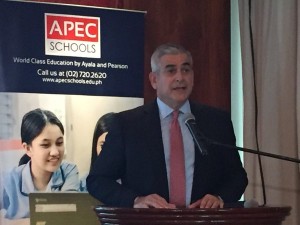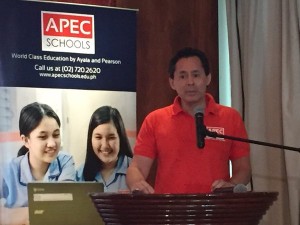AFFORDABLE Private Education Center (APEC) Inc., a chain of for-profit schools set up by the Ayala group three years ago, expects to reach 9,000 in student enrollment by July with the new K-12 educational system now in full swing.
In a press briefing on Tuesday, Ayala Corp. chair and chief executive officer Jaime Augusto Zobel de Ayala said education was a sector that’s undergoing some “disruption” and the conglomerate would like to be a “constructive force” in this space.
“As a group, Ayala feels strongly about helping pave the way for affordable and quality education for as many Filipino youth as possible. We believe that the need to improve access to quality education is critical to our country’s national development, both from an economic and social perspective,” Zobel de Ayala said.
APEC Schools – a partnership between Ayala Education Inc. and British education group Pearson Affordable Learning – now educates 3,300 students in 24 sites. When it started in 2013, it only had one site and 130 students.
“Our target is to grow to 27 sites and 9,000 students by this July,” Ayala Education president Fred Ayala said, noting that the growth in enrollment would be achieved by adding senior high school and opening new schools.
With the K-12 law in full swing nationwide effective school year 2016-2017, incoming grade 11 students are expected to comprise majority of APEC Schools’ new student population.
Zobel de Ayala said the Ayala group was delighted with the progress that APEC Schools had made under the leadership of Fred Ayala and APEC Schools president Beth Lui. He noted that APEC’s “unique approach of deeply embedding employability skills” combined with its thrust of making English proficiency part and parcel of the equation had been able to improve by at least 20 percent the starting salary level obtained by APEC graduates.
To improve the competitiveness of its manpower base, the Philippines has shifted to the K-12 education program, which requires at least one year of kindergarten education, six years of elementary education and six years of secondary education. Secondary education now includes four years of junior high and two years of senior high school education.
APEC Schools focuses on providing education to levels Grades 7 to 12. For senior high school (Grades 11 and 12), APEC Schools offers “LINC” or “Learning with Industry Collaboration” which has three unique features: mastery of English, technology immersion and connection with employer partners.
The idea is to empower graduates to either pursue college or find employment right away. At the end of program, the students would have learned new skills like processing bank loans or selling Android phones or leading a small IT team.
“It is our goal that as many young Filipinos as possible should have access to modern and tech-enabled learning systems,” Lui said.
The school network offers classes in two shifts: morning and afternoon. It offers Grade 11 seats during the afternoon shift to public school Grade 10 graduates at an all-in cost of P22,500 – inclusive of tuition, air-conditioning fee and books – equivalent to the senior high school voucher that the Department of Education (DepEd) is providing to all public school graduates in the National Capital Region (NCR). This means that public school graduates who enroll at APEC Schools can attend without additional cost. About 3,500 seats have been earmarked for public school Grade 10 graduates within the NCR at zero cost.
Outside the NCR, APEC Schools is lowering the cost of afternoon shift to match the value of DepEd’s voucher in these locations.
APEC Schools will also offer 2,500 Grade 11 seats during its morning shift to both public and private school Grade 10 graduates at an all-in cost of P32,000. For public school graduates in the NCR, this translates to a net cost of P10,000 after taking into account the DepEd voucher. For private school graduates who qualify for 80 percent of the DepEd voucher, this translates to an out-of-pocket cost of P14,500.
This school network currently caters to the C-D income segments, with half of its enrollees coming from public schools. With the acceptable of vouchers from DepEd, Lui said the student base could be expanded to include the E income segment.



